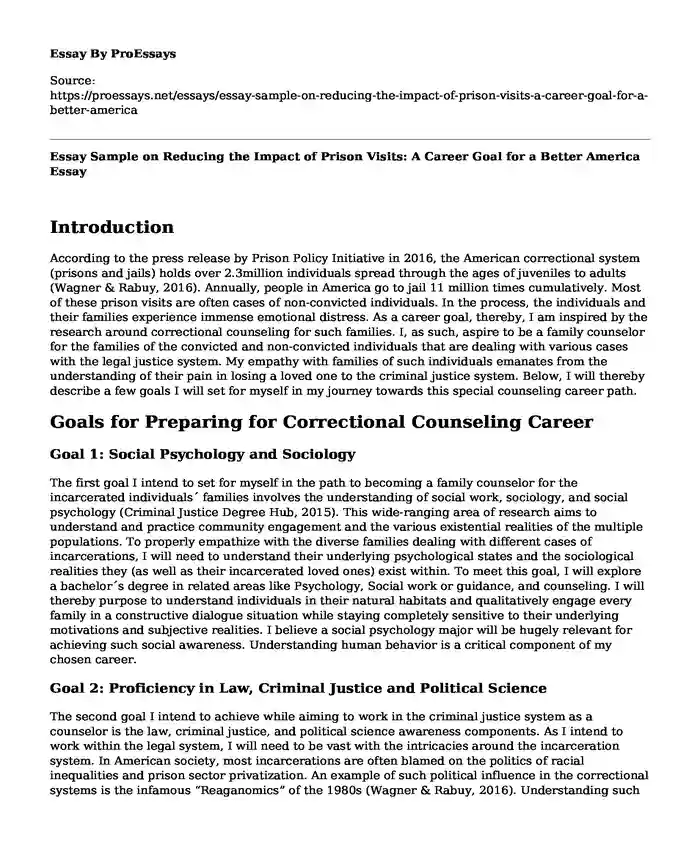Introduction
According to the press release by Prison Policy Initiative in 2016, the American correctional system (prisons and jails) holds over 2.3million individuals spread through the ages of juveniles to adults (Wagner & Rabuy, 2016). Annually, people in America go to jail 11 million times cumulatively. Most of these prison visits are often cases of non-convicted individuals. In the process, the individuals and their families experience immense emotional distress. As a career goal, thereby, I am inspired by the research around correctional counseling for such families. I, as such, aspire to be a family counselor for the families of the convicted and non-convicted individuals that are dealing with various cases with the legal justice system. My empathy with families of such individuals emanates from the understanding of their pain in losing a loved one to the criminal justice system. Below, I will thereby describe a few goals I will set for myself in my journey towards this special counseling career path.
Goals for Preparing for Correctional Counseling Career
Goal 1: Social Psychology and Sociology
The first goal I intend to set for myself in the path to becoming a family counselor for the incarcerated individuals´ families involves the understanding of social work, sociology, and social psychology (Criminal Justice Degree Hub, 2015). This wide-ranging area of research aims to understand and practice community engagement and the various existential realities of the multiple populations. To properly empathize with the diverse families dealing with different cases of incarcerations, I will need to understand their underlying psychological states and the sociological realities they (as well as their incarcerated loved ones) exist within. To meet this goal, I will explore a bachelor´s degree in related areas like Psychology, Social work or guidance, and counseling. I will thereby purpose to understand individuals in their natural habitats and qualitatively engage every family in a constructive dialogue situation while staying completely sensitive to their underlying motivations and subjective realities. I believe a social psychology major will be hugely relevant for achieving such social awareness. Understanding human behavior is a critical component of my chosen career.
Goal 2: Proficiency in Law, Criminal Justice and Political Science
The second goal I intend to achieve while aiming to work in the criminal justice system as a counselor is the law, criminal justice, and political science awareness components. As I intend to work within the legal system, I will need to be vast with the intricacies around the incarceration system. In American society, most incarcerations are often blamed on the politics of racial inequalities and prison sector privatization. An example of such political influence in the correctional systems is the infamous “Reaganomics” of the 1980s (Wagner & Rabuy, 2016). Understanding such intricate links between the criminal justice system, the political system, and the American public is a useful step towards understanding the most relevant approaches to context-specific counseling practices for the convicts, ex-convicts, jailed non-convicts and their families. To achieve this goal, I will enroll in minor courses around the various topics, including criminal justice system and political science alongside the significant courses in sociology, psychology, and guidance and counseling. I may, furthermore, decide to pursue short-term certificate courses in these areas around the legal and political components of the justice system (Criminal Justice Degree Hub, 2015).
Goal 3: Attending Internships and Correctional Training Programs
Lastly, I will set myself the practice-inclined goal of attending internships and training programs in community work and correctional training. As such, I will allow myself to practice the learned components in real-life counseling situations while simultaneously impacting the community and families of the prisoners (Criminal Justice Degree Hub, 2015). To attain this practical counseling goal, I will engage with my College in locating internship placement locations that are relevant to my interests. I will, thus, immerse myself in difficult counseling situations in diverse racial and ethnic setups.
Conclusion
I am highly inspired by the various women and men across the system who acquire and maintain the strength to deal with losing their loved ones to the correctional system. My empathy with such families has sparked my interest in helping them in psychologically adapting to the absence of such loved ones and later reintegrating the loved ones into society. In this mostly personal piece, thereby, I set out my proposed journey towards gaining practical and theoretical skills in helping such families. I hereby set out three goals that I intend to accomplish in my proposed journey towards becoming a correctional counselor that majors primarily with the offenders´ families.
Bibliography
Criminal Justice Degree Hub. (2015, May 24). How Do I Become a Correctional Counselor? Criminal Justice Degree Hub. https://www.criminaljusticedegreehub.com/how-do-i-become-a-correctional-counselor/.
Wagner, P., & Rabuy, B. (2016, March 14). Mass Incarceration: The Whole Pie 2016. Prison Policy Initiative. https://www.prisonpolicy.org/reports/pie2016.html.
Cite this page
Essay Sample on Reducing the Impact of Prison Visits: A Career Goal for a Better America. (2023, Oct 03). Retrieved from https://proessays.net/essays/essay-sample-on-reducing-the-impact-of-prison-visits-a-career-goal-for-a-better-america
If you are the original author of this essay and no longer wish to have it published on the ProEssays website, please click below to request its removal:
- Essay Example on the White-African American Achievement Gap
- Paper Example on Jews and Civil Rights Movement
- Legal Implications: Unpaid Internship for International Students Essay
- Essay on Motivating African American Males in Public Schools: Exploring the Role of Principals
- Essay on Maximizing Freshman English Course Performance: ACCUPLACER Cutoff Scores and GPA
- Essay Example on Remote Working: Challenges of Leadership in Virtual Teams
- Essay Example on a Look Into Surveillance: Ancient to Modern Monitoring Techniques







